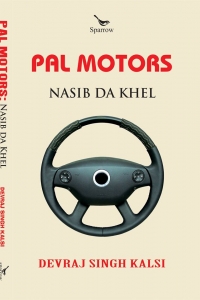
Mr. Nandy came to know of my literary pursuit from his consultant friend. When I confirmed that I have indeed written a novel, Mr. Nandy gave a smirk that emerged powerfully on his much-wrinkled face. It combined his mighty reluctance, acquired in the seven decades of his existence, to admit that a Sikh could attempt something ambitious like that. Perhaps his prejudiced bifocal vision found me suitable as a farmer, truck driver, or a dhaba owner – the kind of family-owned business for members of my community.
Mr. Nandy knew me as a jovial guy who cracked original jokes and recycled very little except paper and plastic. About my pursuits he had little information save the fact that I made ads – not wrote them. As a big revelation it came to him when I disclosed the prized information that I hoped would receive better treatment from a senior person who carried a fairly educated head nurtured on classics and during the times when everything including education, water, and air used to be pure.
“Do you write in Punjabi?” he asked me, with an air of superiority.
“No, English,” I replied, without much verve.
This disclosure dragged him to a different pitch as he began describing his encounters with Sikh buddies long ago. His anecdotal recollection was meant to classify Sikhs as a moronic community that prospered in a trade or served well in the armed forces. While these pursuits are in no way inferior to any other intellectual activity, it was somehow difficult for him to admit that Sikhs have now started taking interest in cerebral matters that have traditionally been restricted to a few communities in the country. A democratization of intellectual vigour was an alien concept that ruffled him. That something revolutionary was underway on this count within several parts of the country was what he missed despite all his insight and foresight. If Sikhs in Punjab and elsewhere could grow fond of fish to enrich their brains, it was quite logical to expect that they are nourishing those heads to achieve something intellectually stimulating in the field of arts, culture, and science. If that challenges or marginalizes the bloated pride of the communities already engaged in a big way in these pursuits, they need to think afresh and accommodate change.
“Living in Bengal has inspired Sikhs to try out different things. I find them singing a lot these days,” Mr. Nandy quipped, taking full credit for cultural influences.
I had to stay away from the well-laid trap. One sharp comment would cut him close to the brittle bone. One attempt to criticize his view or offer a counterpoint could lead to a verbal spat in which he would locate a dozen odd behavioral flaws and link it to my Sikh blood or genes.
“How long have you lived in Bengal?” he wanted to know.
“All my life,” I answered quickly.
It deserves to be mentioned here that Mr. Nandy worked as a senior Finance professional in an Indian FMCG giant in what was then known as Bombay. After retirement, he settled in this sleepy, suburban town to spend his years in peace. A regular reader of newspapers and magazines, Mr. Nandy spent two hours every day in the investment consultancy run by his friend where he advised investors what to buy from the stock market or when to sell. His researched-based tips were correct most of the time and so he won the respect and admiration of the large group of investors who listened more to him than the business channels and their panel advisors.
Having heard about my foray into writing, he felt an urge to test my basics. He began asking about the writers – other than Khushwant Singh – that I had read. When I included a few noted Bengali authors in translation to comprise my reading list, he connected closer with me. He jettisoned his condescending streak and offered me a seat beside him to conduct the rest of the interview. The first sign he was beginning to consider me an equal or someone worthy to discuss literature with.
“What is your novel all about?” he asked grimly.
“It is a family story, simple story-telling, nothing thought-provoking,” I replied modestly, avoiding the word ‘literary’ as it would get his goat.
“Oh, nice,” he remarked, feeling relieved. “Do gift me a signed copy.”
The autograph bit brought a wan smile on his face instead of mine. He seemed to be fond of author signed books though I had major doubts about his pretensions.
I had no idea what was coming next, but I was prepared to sit and take it in the right spirit. He bounced a tricky question this time.
“Have you written anything before this?” he asked, with the hope that this was probably my first attempt.
“Yes, I have been writing in the papers, for the Statesman for years,” I answered with a straight face.
“Statesman? I have been a loyal reader since the 60s, never seen your byline,” he shot back vehemently.
This denial was difficult to bear. I had to show him the evidence.
I opened my tab, connected online and showed him some sample articles published in The Statesman. He read a couple of the middle pieces. The investment consultant walked in and soon we engaged in paperwork. Mr. Nandy was lost in reading the articles. In fifteen minutes, he had read quite a few of my published works. He placed the tab on the table and remained unusually quiet.
“What happened, Uncle, silent?” I poked him this time.
He flashed a naughty smile and stood up on finding an excuse rush forth to his active mind.
“I am getting late, have to go to the bank to update the passbook.”
Since he had not spoken a word on what he had read, I aimed a specific one, “You did not like my pieces?”
“Oh, yes, very much. Quite engaging, biting humour, smartly written,” he replied.
“Thank you, Sir,” I replied with rare humility I could easily gather on this occasion.
He was eager to slip out when I began to raise more questions. He was squirming by now.
“I have read one letter to the editor that you wrote recently,” I said, to prick him.
He went red in the face and tried to make his achievement sound insignificant.
“Oh that, just practice work, once in a while, when I see a social problem or a political crisis, I feel helpless and cannot resist the pen.”
“I have read all your letters published this year. You raise valid points.”
“I am getting really late, friend, have to go now,” he said and chickened out without responding to my compliment.
His unlocked bicycle was leaning against the left wall outside the chamber. He walked with it down the road instead of riding it, head lowered, perhaps lost in contemplation, with several questions popping in his mind. His conditioned mindset must be shaken badly. There was no way to salvage his pride and nurture prejudice.
Walking down the road, I met a Sardar carrying a ring of keys and locks. Mr. Nandy also went that way, and I do not know how he would have felt on seeing this Sardar. A sight to feel disgusted about, a visual disturbance to ignore just like floaters in eyes, or a timely spotting of a specimen that reassured him that the trend was still unchanged and it would not happen during his lifetime at least.
I guess he must have conducted a delightful conversation with himself, confessing unwillingly to himself that his mind had already been unlocked today, with an unexpected key. Though at 77, it made little difference whether he carried prejudices with him to the burning ghat or abandoned these prejudices in this world like other worldly riches. However, it made me wonder why even educated people carry warped minds that love to stereotype gender, caste, community, cultures, and nationalities.
----------------------
By Devraj Singh Kalsi
About the author
His stories and articles have been published in The Bombay Review, Earthen Lamp Journal, Readomania.com, Open Road Review, Deccan Herald, The Pioneer, Tehelka, The Assam Tribune, and The Statesman. His debut novel, PAL MOTORS, is getting published this year.
-----------------
About the Author







Comments